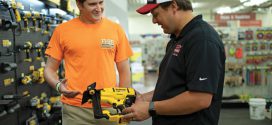Employers who want to understand how they can keep their best employees from leaving to work somewhere else need to understand the changing needs of today’s workforce. A recent study from data and analytics firm Gallup, State of the American Workplace, reveals ways employers can retain their employees and improve their performance. Sam Acuna, managing consultant with Gallup, spoke with Hardware Retailing about highlights of the study’s findings and how retailers can better engage their employees.
Hardware Retailing (HR): What trends are affecting employee turnover?
Sam Acuna (SA): We have research that shows the manager being able to impact up to 70 percent of an employee’s engagement. A big difference between an engaged employee and a disengaged employee is the relationship with their manager. There is a change happening in what people expect out of the workplace. A job used to be about a paycheck; now people want a job with a purpose. People used to think of their manager as their boss; now they are looking for a coach. It’s not just about annual reviews; they want regular feedback, regular conversations.
We also need to realize that employees are becoming consumers of the workplace. When you think of your consumer, you want them to have the best experience. That’s how you have to treat your employees. What are some things that drive that experience? The manager is a big part of that experience.
HR: You mentioned that employees want managers who are coaches. What can a manager do to be more like a coach?
SA: When you think about a coach in sports, it’s not the guy in the owner’s box. It’s the one on the floor with the team seeing what he can do to impact the organization. A coach is in the moment. If you do something wrong, they are going to tell you right away. If you do something right, they are going to tell you right away too.
It will also help coaches to understand what we call the Q12, or the 12 drivers of engagement. There are certain needs employees have, similar to Maslow’s hierarchy of needs.
One of the first things employees need to know is what they are expected to do at work. What are the job demands? Do they have the materials and equipment to do the job? Do they know how to support their customer? The manager needs to have a conversation with employees so understand if they feel equipped to do their job. Managers need to make sure those basic needs are met if they want employees to be engaged, and that means managers need to be engaged with their employees.
Our study shows that employees who are supervised by highly engaged managers are 59 percent more likely to be more engaged than those supervised by disengaged managers. It’s a cascade effect. The more engagement there is at the top, the more it will trickle down to the bottom.
More than 50 percent of voluntary turns, or people who leave on their own will, say their manager could have convinced them to stay if they had talked about job satisfaction or their future with the organization. That’s a simple thing to talk about.
Training is not the only way to invest in employees. Development could also be an assignment that stretches them to grow. It could be a different role where they learn new skills. Get creative. Little moves can go a long way toward developing an employee.
HR: Many retailers struggle with employees who only think of retail as a temporary job, not a career path, and so they may have no intention of staying. What would be your advice for how they should develop those employees?
SA: Think of employees as consumers and your brand ambassadors. They are eventually going to be your next consumer. An employee with a good job experience will likely continue to shop with you after they leave, and will tell their friends about you. Employees can also be talent ambassadors for you. They’ll serve as a pipeline for future employment and referrals. They can also help the brand of the independent retailer down the road if they move into other areas of the country.
HR: Will the COVID-19 pandemic have any long-lasting impacts on employee retention and turnover?
SA: Some employee behaviors will be different long term. BOPIS will become more of the norm and managers will need to train employees on new expected behaviors. Before, a customer would come in the store and someone would greet them. Now, you may be serving the customer by going outside the store to meet them. Do employees need extra training to do that? Do they have the tools and equipment to effectively serve customers outside the store?
Training is even more significant today during COVID-19. Everyone is very concerned and at a heightened emotional state. It is a very big opportunity to make or break the customer experience. If you do it well, you can win the customer forever. But if you are a customer and you meet an employee who you feel jeopardizes your safety at an emotional time, you are going to be turned off by that.
 Hardware Retailing The Industry's Source for Insights and Information
Hardware Retailing The Industry's Source for Insights and Information








